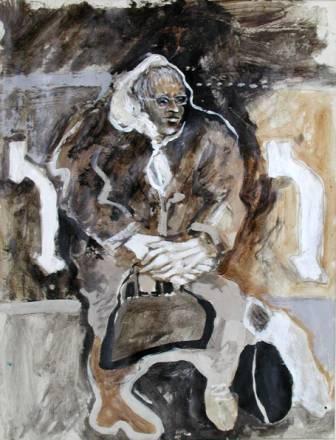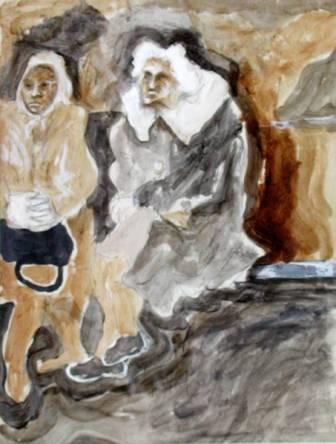 |
| HOME | GLOBAL | DISTRICTS | CLUBS | MISSING HISTORIES | PAUL HARRIS | PEACE |
| PRESIDENTS | CONVENTIONS | POST YOUR HISTORY | WOMEN | FOUNDATION | COMMENTS | PHILOSOPHY |
| SEARCH | SUBSCRIPTIONS | JOIN RGHF | EXPLORE RGHF | RGHF QUIZ | RGHF MISSION | |
|
|
|
Joseph L. Kagle, Jr. Peace Essays
|
|
Where do you find the colors of peace, the separate ethnic mix that must go together for the completion of the college that will be a world without destructive actions? You go to someplace where you, as an affluent American, normally does not visit, a place where economics makes for leveling and flat world thinking, a place of movement and yet seeming to stand still in time. You go to the bus station, just after the evacuees from Katrina come to Houston, Texas. This is where you might find the mix for the food of peace.
The Bus Terminal
The sign above the automatic dispensers, for Pepsi, Cold Drinks, M & M and Plastic Goodies, read: "This terminal is on time certified to better serve you." Of course, many of the buses were late, including the one that held my son on his first trip from Waco to Houston. His schedule had been to leave at 3:30 P.M. and arrive at 7:45 P.M. (the only bus that comes in non-stop during the week). He left at 4:10 and was to arrive after 9:00 (maybe). Therefore, there was plenty of time to do what I enjoy when I have this kind of time: people watch.
We had just visited my daughter, her husband and our two grandchildren in Fall Creek, a subdivision where the minimum price for a home was over $300,000 and climbed to $2,000,000,000. The bus station had none of those home owners as travelers. This was the Katrina evacuees and low income residences of Houston. Like Iraq, everywhere you looked there was video surveillance. All the seats were hard metal. You could, while waiting, purchase a pre-paid phone card or get a haircut or buy a meal from KFC (used to be Kentucky Fried Chicken) (which had a special of a Breakfast Box for $3.00 to take on your trip) (that is, if you had the money for it).
Everyone was dressed less than casual, although one strikingly handsome black woman with a golden turban, a colorful African dress and an original cane with writhing red, yellow and blue veins of color seemed to stride above the others around her. "The cane was made for me as a present from my son," she told me when I commented on how beautiful it was. The young girl at her side had on a leopard-patterned jacket. They were a contrast to the aging black man with the noticeable limp and a rolled bed on his back. One other woman wore ear loop-rings the size of Scrogg's door knockers, pulling a young child by the hand so that his feet only sometimes hit the floor. .
Nobody noticed except me but I am sure that we stood out there since there were only two other white couples (most of the station was filled by 2/3 Hispanics, 1/3 Blacks and no Orientals). They did not notice as they spread out a blanket for a supper of eight from McDonalds across the street. They laid their oversize suitcases, boxes tied with rough rope and other belongings on the seats above.
The bus terminal was organized with two eight-gate parking areas for the buses on each side of a main reception hall. Incoming and exiting buses were announced over a crackling speaker that was difficult to understand. Long lines waited hours for the buses as the best seats were scarce. Some in the line had obviously waited for some time as they lay on the floor sleeping in each other's arms or propped up against the concrete wall.
I could easily picture this scene in New Orleans as families took what was precious to them on their backs, in baby carriages or shopping carts, waiting for buses to take them to safety and a place of privacy. This was American society at its basic, elemental level. Ironically, the Hispanic man next to me carried his own level and a bag (filled with other tools of his trade) in one hand, a suitcase tied with a colorful ribbon in the other and a backpack with sleeping essentials strapped upon his shoulders. If one wishes to experience the reality of those that came to Houston from New Orleans when Katrina interrupted their struggle to survive, any bus terminal in any city will give you a picture that will fill your understanding of spectrum on the American scene. Maybe, just maybe, all politicians should spent one evening at the bus terminal (it did not escape me that the word for this destination was "terminal"). These are the people who suffer most when politicians overspend and then cut the programs for the poor to make up for their mistakes and pork. We were happy to leave when the crowded bus from Waco finally got in after nine o'clock and our son was with us for the weekend. For a short period, we had walked (to the smallest degree) in other's shoes and the shoes pinched, being at least one size too small. Of course, for the people at the bus terminal, any shoes are better than none.
|
| RGHF peace historian Joseph L. Kagle, Jr., 30 August 2006 |

